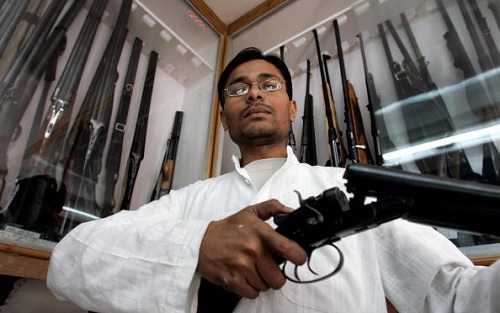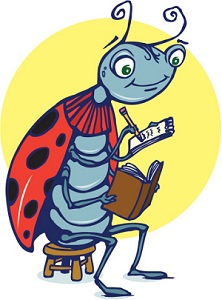Dec 17, 2025
Dec 17, 2025
by Sakshi
Our Beloved Gun-tantra
No-longer- protected species
None of the Rascals
Wrong Turn
All Work No Play
Short- lived Spring
Think it Through
Our Beloved Gun-tantra
UP, you’ll be glad to hear, is a serious contender for the champions trophy as the world’s largest manufacturer of small arms in the unlisted unorganized sector. Gone are the days that the sons of the soil had to travel all the way to Munger in Bihar or Panna in Madhya Pradesh to buy, of all the things in the world, a ‘katta’ which some of you might not know is the name of a county-made pistol.
Isn’t it a great achievement of Samajvadi Party Government? Officially, there’s only one factory in the huge sprawling state in the organized sector that produces small arms. That is situated on the outskirts of Kanpur city. (I hope I’m not divulging a strategic defence secret of the country by naming it.)

Image (c) Manan Vatsyayana/AFP/Gettyimages.com
In this file photograph dated 06 April 2007, Indian arms vendor Gulzar poses in his shop
with a double-barrelled shotgun, in Kanpur. Customers usually come from far and wide to buy
rifles and shotguns from the dozens of tiny shops clustered in a bazaar in the ramshackle
town of Kanpur, billed as the gun capital of India’s Uttar Pradesh state.
In the unorganized sector almost very small town and a sizable village in UP today, is dotted with units that offer small arms that fit every pocket and style. I suggest Harvard Business School should make a case study of what’s called true marketing, namely, identifying what there is a latent demand for and then going in for the big kill.
If you’re looking for a weapon without being encumbered with the hassle of applying for a license, just visit the UP arms bazaar. And should be short of time — politicians are invariably too busy — the manufacturers can arrange home delivery for a little extra.
Those who have surveyed this booming market, found every kind of gun on offer. A newspaper team recently visited 14 districts and — despite the high alert after the Muzaffarnagar riots — met gun agents for asking and visited local katta factories. They reported having met at a dhaba a typical gun-runner who gave them a bland assurance: “Just deposit the money in the bank and the ‘piece’ will be delivered to your doorstep.” And that can be anywhere in India.
An Amazon.com team, I learn, is planning to visit UP to learn a thing or two while Akhilesh Yadav is still around.
Whoever might have been pulling the strings of visible puppets on the stage, the outcome is disconcertingly clear. No longer are the politicians a protected species who can merrily carry on doing things in good old ways. And that heralds the possibility that a profound change is in the offing. And for once, for good.
But who ushered in the new chapter? Is it merely the outburst – spontaneous or fake is another story — of Rahul Baba or it is the fear of rising public wrath that forced the UPA II to junk the contentious ordinance which sought to protect convicted lawmakers from immediate disqualification.
My hunch is that the credit being assigned to the Congress Vice-President to articulate public mood is a well thought out stratagem to build up his image before declaring him as the UPA’s Prime Ministerial candidate to be pitted against Namo, that symbol of reactionary non-secular forces.
That Rajya Sabha member Rasheed Masood, minister of health in the infamous VP Singh government between 1990 and 1991, should have had the unique privilege of being the first MP to lose his seat is an irony of fate. Lalu Prasad who, in fact, deserved that honor hands down almost immediately caught up. Unfortunately in that neck and neck race the chroniclers will, unfortunately, declare him a very close second.
So, henceforth our hitherto protected species called MP’s won’t have the privilege of eating the cake and having it too.
Don’t grudge the credit in this melodrama due to Empress Dowager who performed with such consummate skill the favorite trick – doing the split lunge forward and backwards with bewildering speed – in the political ballet that has been performing on the national stage for the last ten years.
In a landmark verdict, the Supreme Court held that citizens have right to cast negative vote rejecting all candidates contesting polls. This will be positive incentive for those not satisfied with all the contestants in the fray, to turn up for voting.
The apex court has directed the Election Commission to provide ‘none of the above options’ at the end of the list of candidates in electronic voting machines (EVMs) and ballot papers to allow voters to reject those contesting polls.
The bench noted that the concept of negative voting is prevalent in 13 countries and even in India; parliamentarians are given an option to press the button for abstaining while voting takes place in the House.
I await the day when it is also stipulated that in case one third of the voters opting for the ‘none of the above’ option, a re-election would follow. That alone will instill some fear of God among our politicians.
You better double check your route the next time when you seek driving directions from your smartphone. The BBC reports that a glitch in the Apple iPhone maps app recently resulted in some people driving directly onto the runway of – hold your breath – an Alaskan airport. Fairbanks International Airport had to shut down an access road normally reserved for local pilots after at least two motorists steered their vehicles right onto the runway.
Imagine this had happened in John F. Kennedy airport, New York. The first reaction would indeed have been it is all Al-Qaeda handiwork.
To resume the story, they drove right across the runway to get to the terminal. Luckily, there was no accident and no planes were landing.
Apple has fixed the app, but declined to comment on the glitch. Steve Jobs can, meanwhile, rest in his grave.
When the American psychologist Wayne Oates died in 1999, The New York Times obituary mentioned, in particular, two facts about him. First, the man had written an astonishing number of books — 57, which any writer in the world would envy. Secondly, he had coined a new word, namely, workaholic. Oates coined the now-ubiquitous term in a 1968 essay, in which he confessed that his own addiction to industriousness had been a disorder almost akin to addiction to alcohol. True, he knew that workaholism is much more socially respectable than downing half a bottle of whisky every a day — more the sort of personality trait that might help someone, say, earn a place in the Guinness Book of Records.
 What, precisely, qualifies someone as a workaholic? There’s still no single accepted medical definition. But psychologists have tried to distinguish people merely devoted to their careers from the true addicts. A seminal 1992 paper on how to measure the condition argued that real sufferers work not only compulsively but also with little enjoyment.
What, precisely, qualifies someone as a workaholic? There’s still no single accepted medical definition. But psychologists have tried to distinguish people merely devoted to their careers from the true addicts. A seminal 1992 paper on how to measure the condition argued that real sufferers work not only compulsively but also with little enjoyment.
Perhaps unsurprisingly, spouses of workaholics tend to report unhappiness with their marriage. Having a workaholic parent is hardly better. A study of college undergraduates found that children of workaholics scored 72 percent higher on measures of depression than children of alcoholics. They also exhibited more-severe levels of “parentification” — a term family therapists use for sons and daughters who, as the paper put it, “are parents to their own parents and sacrifice their own needs … to accommodate and care for the emotional needs and pursuits of parents or another family member”.
How many people are true workaholics? One recent estimate suggests that about 10 percent of U.S. adults might qualify; the proportion is as high as 23 percent among lawyers, doctors, and psychologists.
Observers have noticed a sharp contrast between the lavish state banquet that United States President Barack Obama hosted for Prime Minister Manmohan Singh during their first summit and the brief, working lunch that was part of their last official get-together. The first was promoted as the beginning of great new journey. Now they seem to be struggling to assure each other that they are going together, but neither is too sure of the destination.
Those who care to look beyond the tip of their nose, are familiar with American obsession of short-term transactions in all walks of life — from the institution of marriage to bilateral bonds of friendship. In the long run, it is hail-fellow-well-met philosophy in the long run.
During the Second World War the Brits bent backwards to help Americans develop nuclear weaponry. The moment the war was over, the US passed a law completely banning the sharing of nuclear know-how with anyone, and that included UK too. When Attlee learnt of it he was red-faced and described yesterday’s pals as bast***s. The trouble is Manmohan Singh doesn’t know of many swear terms.
The famous American comedian George Burns who during the century he completed before answering the Maker’s call and lived to span the whole range of comic media –vaudeville, film, radio and TV—famously said: “Too bad all the people who know how to run the country are too busy driving taxicabs or cutting hair.”
Now tell me should our good friend, Lalu Prasad who ran railways so perfectly well, languish in jail while the UP branch of Yadavs is having a gala time?
Images (c) Gettyimages.com
06-Oct-2013
More by : Sakshi

|
Your expressions are really an eye opener but, the chaotic dimensions is reaching new exponential peaks with time. Don't you think it is the centralized approach which is to be blamed ? When every individual lived a responsible life, the situation was harmonious and societies lived peacefully. It is only when modern science & its technologies were imposed by a greed section of mankind on mankind in general, the natural equation started getting imbalanced. As a cyclic process the present chaotic scenario is the reflection. It is still in the reach of common mankind to realize the senseless motives of greedy section and act sensibly. - [Indian Journalists Group - Linkedin] |